Corporations Law Assignment: Rights of Tony Under the Corporations Act
VerifiedAdded on 2023/01/19
|5
|1197
|29
Report
AI Summary
This report analyzes a Corporations Law assignment concerning the rights conferred upon Tony under sections 140 and 232-234 of the Corporations Act 2001 (Cth). The issue revolves around the implications of the company's constitution, replaceable rules, and their contractual effects, binding the company, its directors, and members. The application section presents a scenario involving a jazz club, Fuzzy Jazz Catzz Pty Ltd (FJC), and a conflict arising from a proposed restaurant venture. Ella, the sole director, plans to raise capital by issuing additional shares, a move opposed by other members, particularly Barry, who refuses to purchase additional shares. Ella's failure to inform Tony about the share purchase and subsequent actions are assessed against the replaceable rules, potentially violating section 232 and 234. The report concludes that Tony has rights under section 140 and can take action under sections 232, 233, and 234.
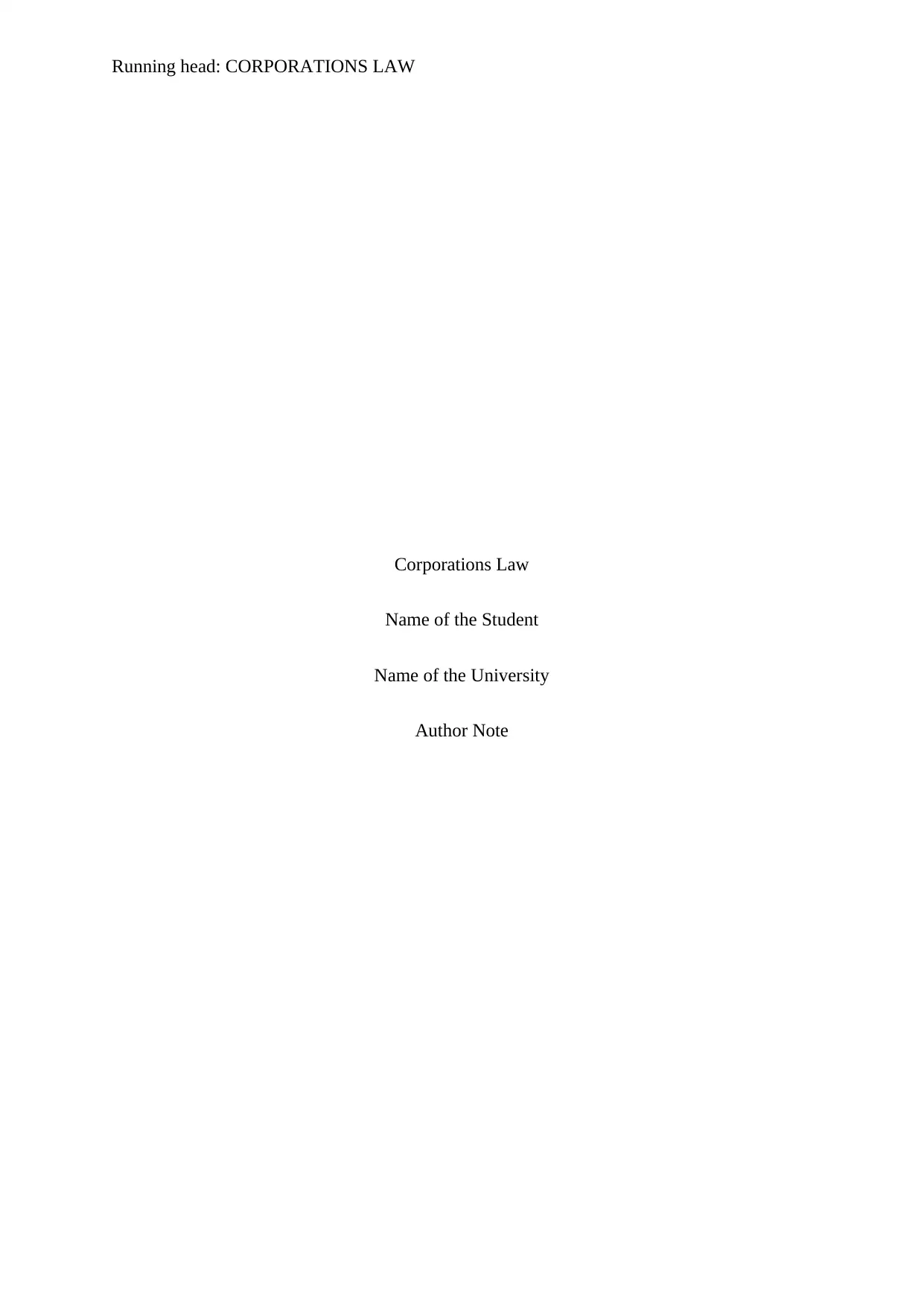
Running head: CORPORATIONS LAW
Corporations Law
Name of the Student
Name of the University
Author Note
Corporations Law
Name of the Student
Name of the University
Author Note
Paraphrase This Document
Need a fresh take? Get an instant paraphrase of this document with our AI Paraphraser
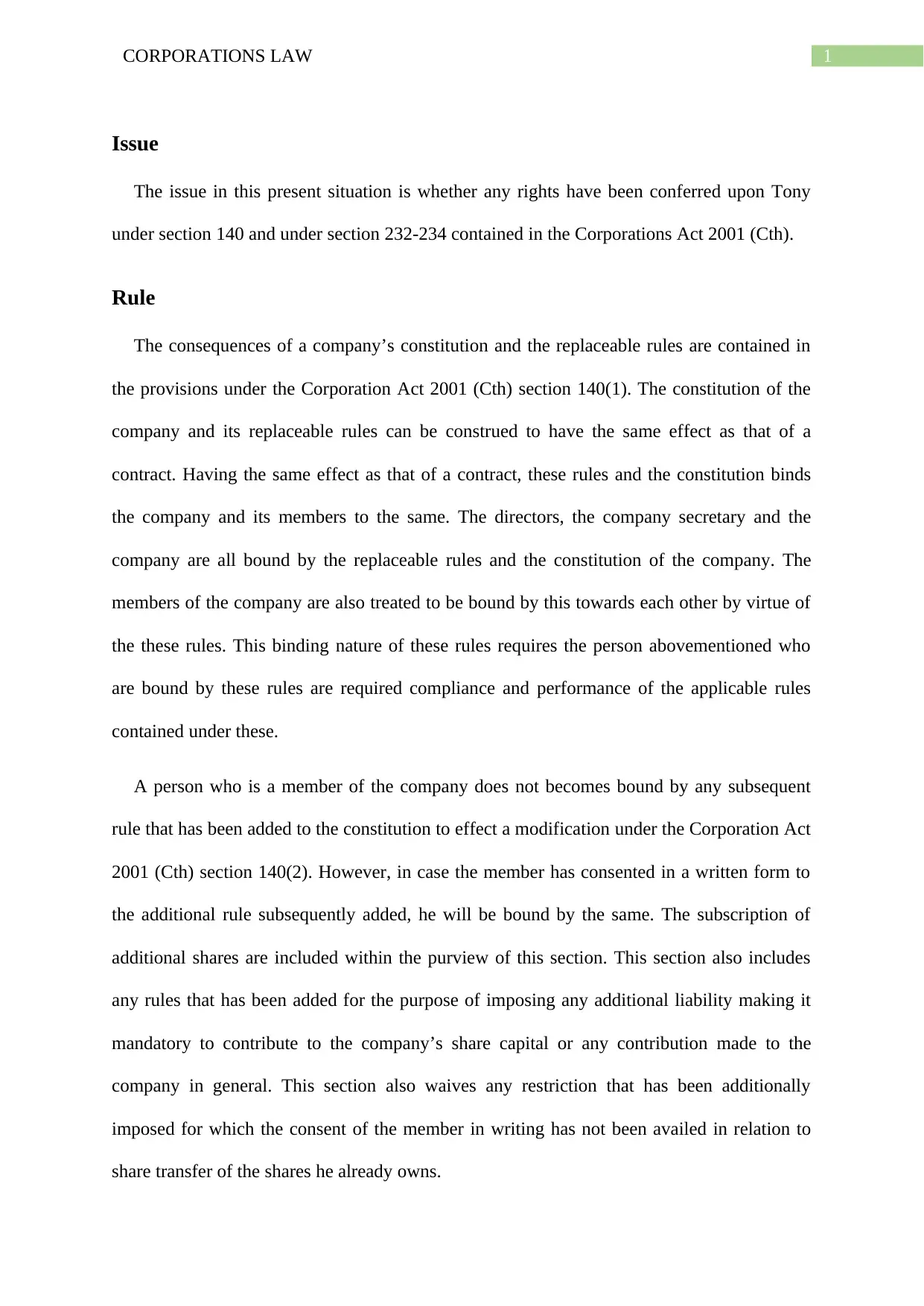
1CORPORATIONS LAW
Issue
The issue in this present situation is whether any rights have been conferred upon Tony
under section 140 and under section 232-234 contained in the Corporations Act 2001 (Cth).
Rule
The consequences of a company’s constitution and the replaceable rules are contained in
the provisions under the Corporation Act 2001 (Cth) section 140(1). The constitution of the
company and its replaceable rules can be construed to have the same effect as that of a
contract. Having the same effect as that of a contract, these rules and the constitution binds
the company and its members to the same. The directors, the company secretary and the
company are all bound by the replaceable rules and the constitution of the company. The
members of the company are also treated to be bound by this towards each other by virtue of
the these rules. This binding nature of these rules requires the person abovementioned who
are bound by these rules are required compliance and performance of the applicable rules
contained under these.
A person who is a member of the company does not becomes bound by any subsequent
rule that has been added to the constitution to effect a modification under the Corporation Act
2001 (Cth) section 140(2). However, in case the member has consented in a written form to
the additional rule subsequently added, he will be bound by the same. The subscription of
additional shares are included within the purview of this section. This section also includes
any rules that has been added for the purpose of imposing any additional liability making it
mandatory to contribute to the company’s share capital or any contribution made to the
company in general. This section also waives any restriction that has been additionally
imposed for which the consent of the member in writing has not been availed in relation to
share transfer of the shares he already owns.
Issue
The issue in this present situation is whether any rights have been conferred upon Tony
under section 140 and under section 232-234 contained in the Corporations Act 2001 (Cth).
Rule
The consequences of a company’s constitution and the replaceable rules are contained in
the provisions under the Corporation Act 2001 (Cth) section 140(1). The constitution of the
company and its replaceable rules can be construed to have the same effect as that of a
contract. Having the same effect as that of a contract, these rules and the constitution binds
the company and its members to the same. The directors, the company secretary and the
company are all bound by the replaceable rules and the constitution of the company. The
members of the company are also treated to be bound by this towards each other by virtue of
the these rules. This binding nature of these rules requires the person abovementioned who
are bound by these rules are required compliance and performance of the applicable rules
contained under these.
A person who is a member of the company does not becomes bound by any subsequent
rule that has been added to the constitution to effect a modification under the Corporation Act
2001 (Cth) section 140(2). However, in case the member has consented in a written form to
the additional rule subsequently added, he will be bound by the same. The subscription of
additional shares are included within the purview of this section. This section also includes
any rules that has been added for the purpose of imposing any additional liability making it
mandatory to contribute to the company’s share capital or any contribution made to the
company in general. This section also waives any restriction that has been additionally
imposed for which the consent of the member in writing has not been availed in relation to
share transfer of the shares he already owns.
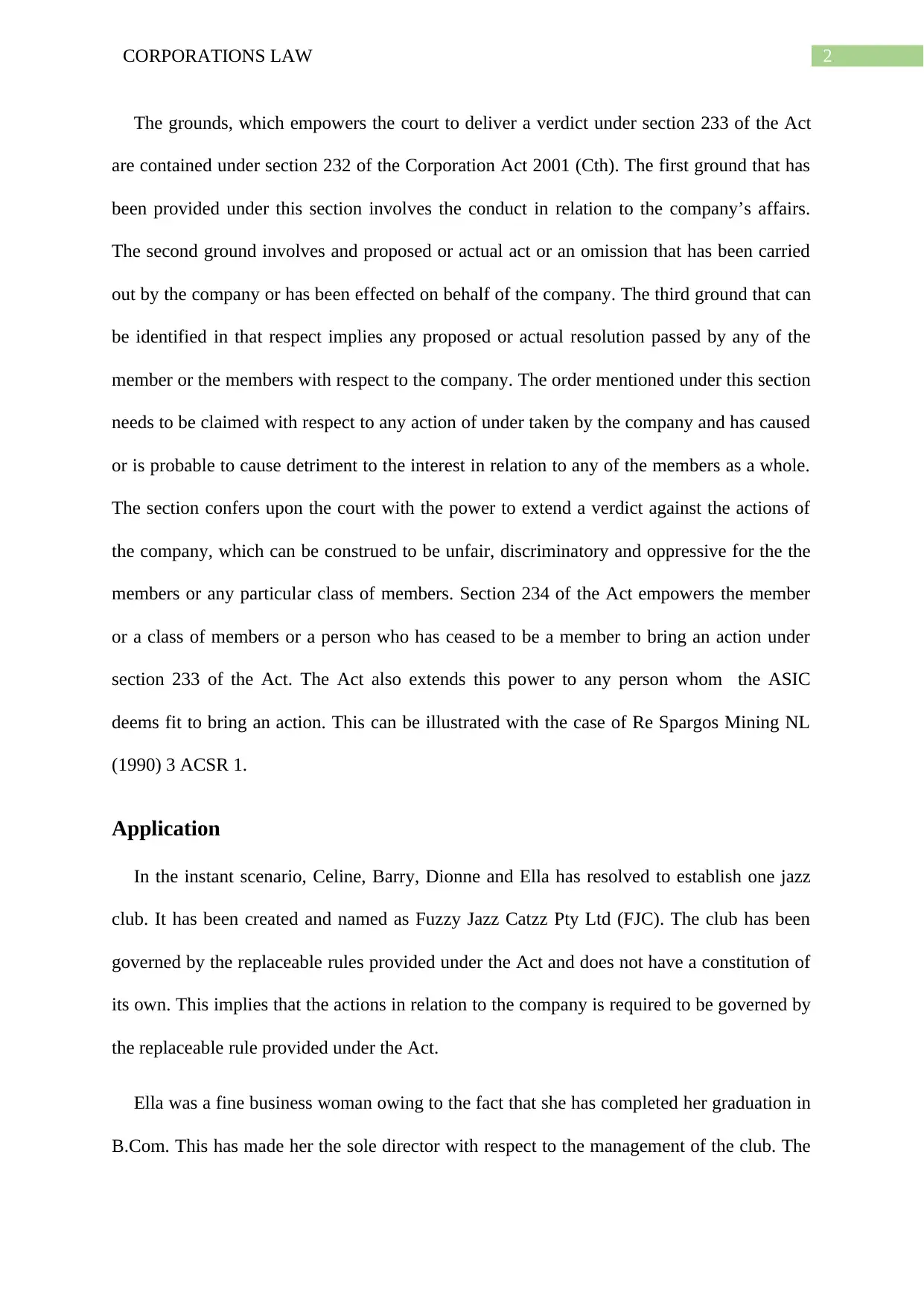
2CORPORATIONS LAW
The grounds, which empowers the court to deliver a verdict under section 233 of the Act
are contained under section 232 of the Corporation Act 2001 (Cth). The first ground that has
been provided under this section involves the conduct in relation to the company’s affairs.
The second ground involves and proposed or actual act or an omission that has been carried
out by the company or has been effected on behalf of the company. The third ground that can
be identified in that respect implies any proposed or actual resolution passed by any of the
member or the members with respect to the company. The order mentioned under this section
needs to be claimed with respect to any action of under taken by the company and has caused
or is probable to cause detriment to the interest in relation to any of the members as a whole.
The section confers upon the court with the power to extend a verdict against the actions of
the company, which can be construed to be unfair, discriminatory and oppressive for the the
members or any particular class of members. Section 234 of the Act empowers the member
or a class of members or a person who has ceased to be a member to bring an action under
section 233 of the Act. The Act also extends this power to any person whom the ASIC
deems fit to bring an action. This can be illustrated with the case of Re Spargos Mining NL
(1990) 3 ACSR 1.
Application
In the instant scenario, Celine, Barry, Dionne and Ella has resolved to establish one jazz
club. It has been created and named as Fuzzy Jazz Catzz Pty Ltd (FJC). The club has been
governed by the replaceable rules provided under the Act and does not have a constitution of
its own. This implies that the actions in relation to the company is required to be governed by
the replaceable rule provided under the Act.
Ella was a fine business woman owing to the fact that she has completed her graduation in
B.Com. This has made her the sole director with respect to the management of the club. The
The grounds, which empowers the court to deliver a verdict under section 233 of the Act
are contained under section 232 of the Corporation Act 2001 (Cth). The first ground that has
been provided under this section involves the conduct in relation to the company’s affairs.
The second ground involves and proposed or actual act or an omission that has been carried
out by the company or has been effected on behalf of the company. The third ground that can
be identified in that respect implies any proposed or actual resolution passed by any of the
member or the members with respect to the company. The order mentioned under this section
needs to be claimed with respect to any action of under taken by the company and has caused
or is probable to cause detriment to the interest in relation to any of the members as a whole.
The section confers upon the court with the power to extend a verdict against the actions of
the company, which can be construed to be unfair, discriminatory and oppressive for the the
members or any particular class of members. Section 234 of the Act empowers the member
or a class of members or a person who has ceased to be a member to bring an action under
section 233 of the Act. The Act also extends this power to any person whom the ASIC
deems fit to bring an action. This can be illustrated with the case of Re Spargos Mining NL
(1990) 3 ACSR 1.
Application
In the instant scenario, Celine, Barry, Dionne and Ella has resolved to establish one jazz
club. It has been created and named as Fuzzy Jazz Catzz Pty Ltd (FJC). The club has been
governed by the replaceable rules provided under the Act and does not have a constitution of
its own. This implies that the actions in relation to the company is required to be governed by
the replaceable rule provided under the Act.
Ella was a fine business woman owing to the fact that she has completed her graduation in
B.Com. This has made her the sole director with respect to the management of the club. The
⊘ This is a preview!⊘
Do you want full access?
Subscribe today to unlock all pages.

Trusted by 1+ million students worldwide
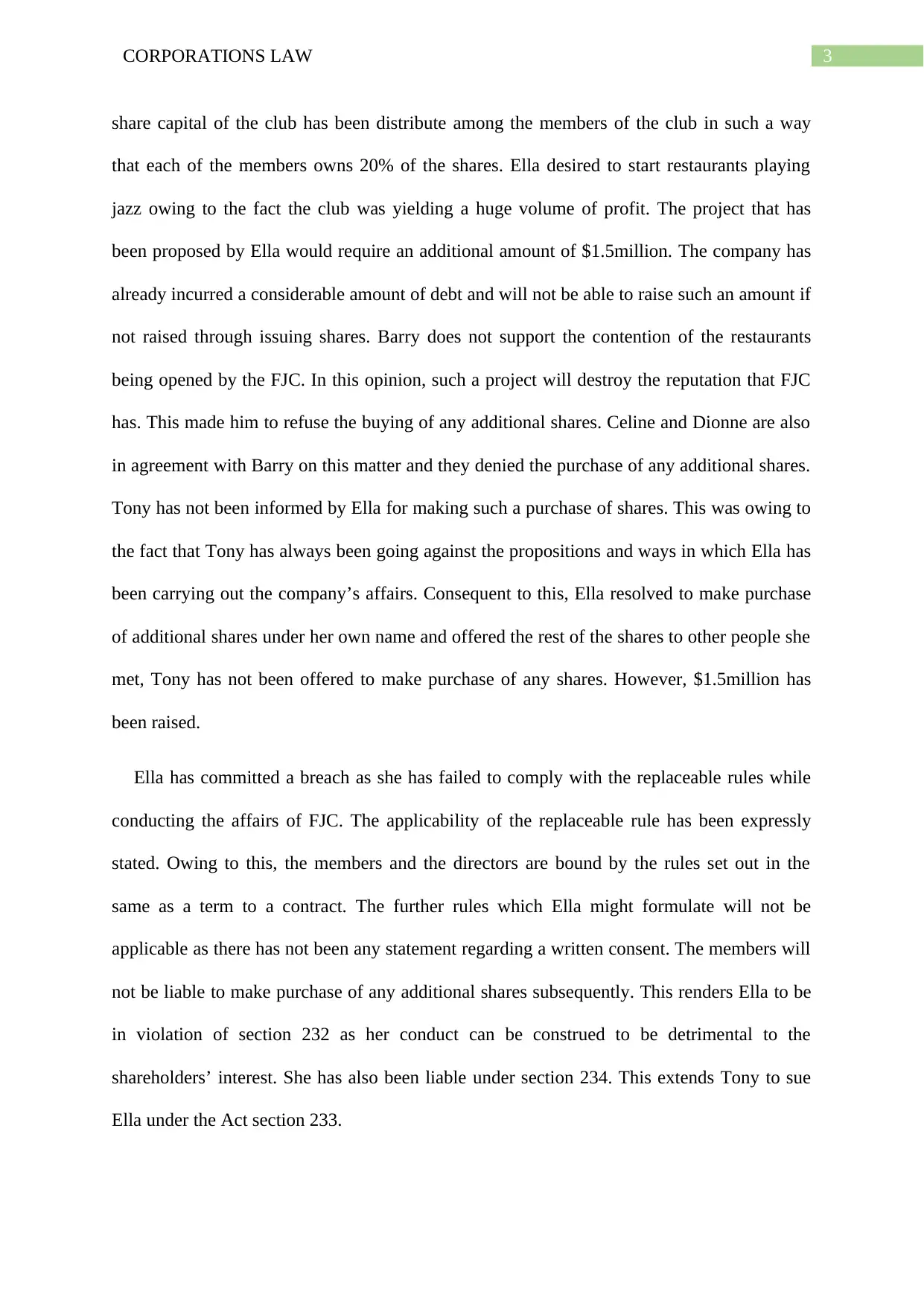
3CORPORATIONS LAW
share capital of the club has been distribute among the members of the club in such a way
that each of the members owns 20% of the shares. Ella desired to start restaurants playing
jazz owing to the fact the club was yielding a huge volume of profit. The project that has
been proposed by Ella would require an additional amount of $1.5million. The company has
already incurred a considerable amount of debt and will not be able to raise such an amount if
not raised through issuing shares. Barry does not support the contention of the restaurants
being opened by the FJC. In this opinion, such a project will destroy the reputation that FJC
has. This made him to refuse the buying of any additional shares. Celine and Dionne are also
in agreement with Barry on this matter and they denied the purchase of any additional shares.
Tony has not been informed by Ella for making such a purchase of shares. This was owing to
the fact that Tony has always been going against the propositions and ways in which Ella has
been carrying out the company’s affairs. Consequent to this, Ella resolved to make purchase
of additional shares under her own name and offered the rest of the shares to other people she
met, Tony has not been offered to make purchase of any shares. However, $1.5million has
been raised.
Ella has committed a breach as she has failed to comply with the replaceable rules while
conducting the affairs of FJC. The applicability of the replaceable rule has been expressly
stated. Owing to this, the members and the directors are bound by the rules set out in the
same as a term to a contract. The further rules which Ella might formulate will not be
applicable as there has not been any statement regarding a written consent. The members will
not be liable to make purchase of any additional shares subsequently. This renders Ella to be
in violation of section 232 as her conduct can be construed to be detrimental to the
shareholders’ interest. She has also been liable under section 234. This extends Tony to sue
Ella under the Act section 233.
share capital of the club has been distribute among the members of the club in such a way
that each of the members owns 20% of the shares. Ella desired to start restaurants playing
jazz owing to the fact the club was yielding a huge volume of profit. The project that has
been proposed by Ella would require an additional amount of $1.5million. The company has
already incurred a considerable amount of debt and will not be able to raise such an amount if
not raised through issuing shares. Barry does not support the contention of the restaurants
being opened by the FJC. In this opinion, such a project will destroy the reputation that FJC
has. This made him to refuse the buying of any additional shares. Celine and Dionne are also
in agreement with Barry on this matter and they denied the purchase of any additional shares.
Tony has not been informed by Ella for making such a purchase of shares. This was owing to
the fact that Tony has always been going against the propositions and ways in which Ella has
been carrying out the company’s affairs. Consequent to this, Ella resolved to make purchase
of additional shares under her own name and offered the rest of the shares to other people she
met, Tony has not been offered to make purchase of any shares. However, $1.5million has
been raised.
Ella has committed a breach as she has failed to comply with the replaceable rules while
conducting the affairs of FJC. The applicability of the replaceable rule has been expressly
stated. Owing to this, the members and the directors are bound by the rules set out in the
same as a term to a contract. The further rules which Ella might formulate will not be
applicable as there has not been any statement regarding a written consent. The members will
not be liable to make purchase of any additional shares subsequently. This renders Ella to be
in violation of section 232 as her conduct can be construed to be detrimental to the
shareholders’ interest. She has also been liable under section 234. This extends Tony to sue
Ella under the Act section 233.
Paraphrase This Document
Need a fresh take? Get an instant paraphrase of this document with our AI Paraphraser
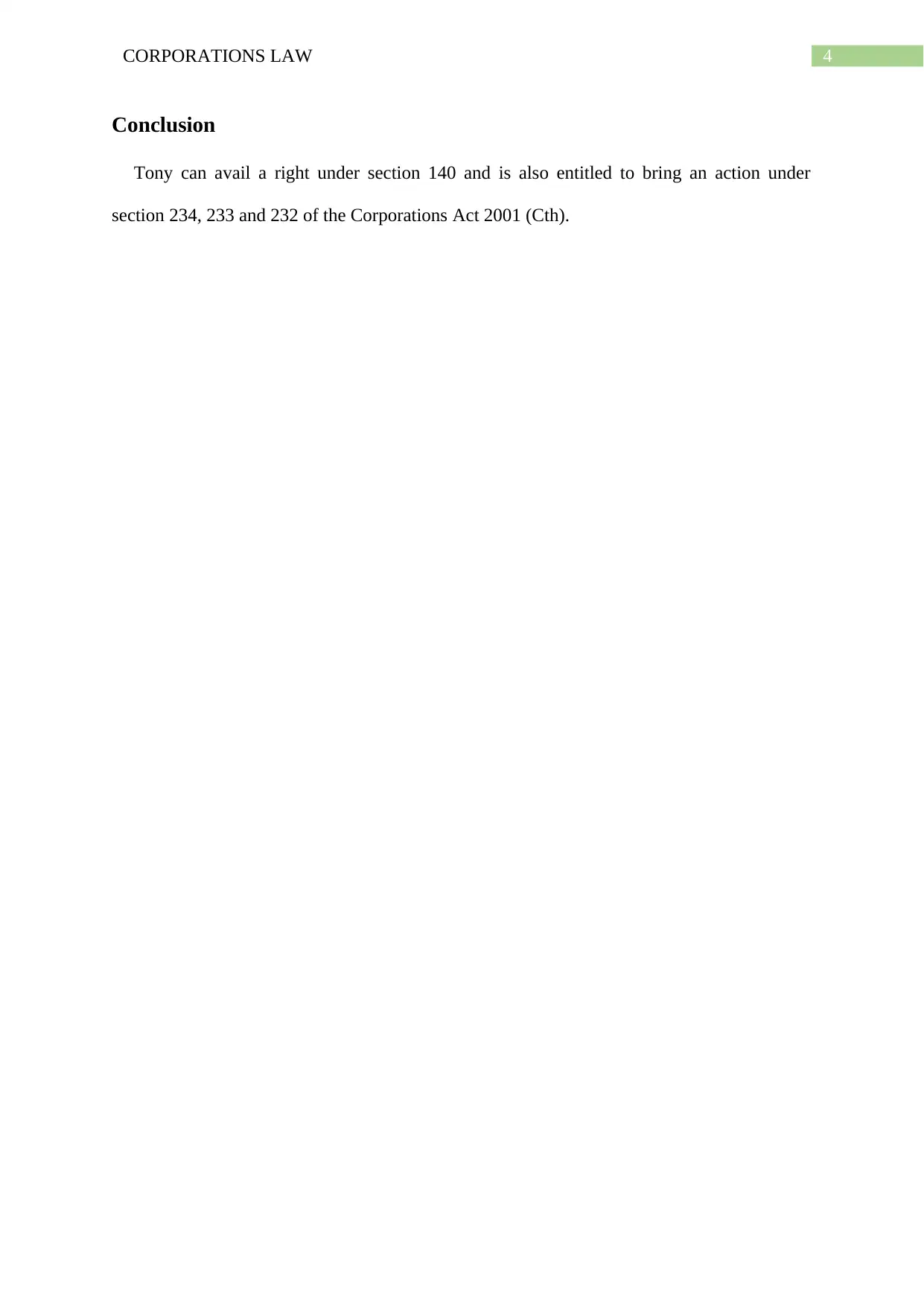
4CORPORATIONS LAW
Conclusion
Tony can avail a right under section 140 and is also entitled to bring an action under
section 234, 233 and 232 of the Corporations Act 2001 (Cth).
Conclusion
Tony can avail a right under section 140 and is also entitled to bring an action under
section 234, 233 and 232 of the Corporations Act 2001 (Cth).
1 out of 5
Related Documents
Your All-in-One AI-Powered Toolkit for Academic Success.
+13062052269
info@desklib.com
Available 24*7 on WhatsApp / Email
![[object Object]](/_next/static/media/star-bottom.7253800d.svg)
Unlock your academic potential
Copyright © 2020–2026 A2Z Services. All Rights Reserved. Developed and managed by ZUCOL.




